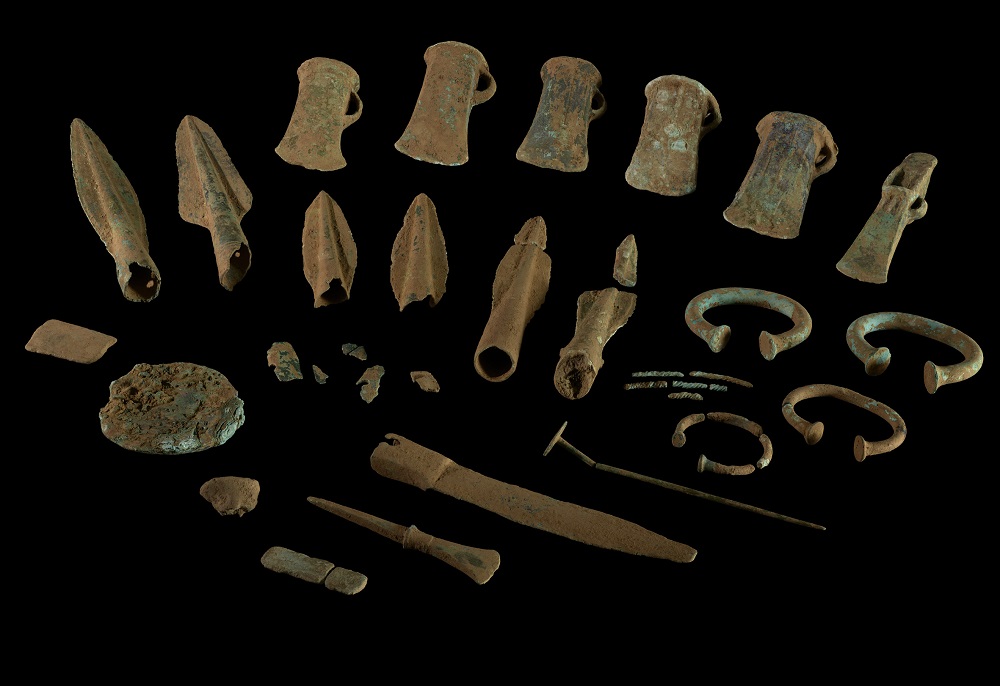Fundraiser launched to keep rare Bronze Age treasure in Ceredigion

A fundraiser has been launched to keep a nationally important hoard of Bronze Age metalwork in Ceredigion.
The find of more than 50 bronze tools, weapons and body ornaments was made by metal detectorists Craig Hearne and Kieran Slade in Llangeitho in 2020.
It was subsequently declared as treasure by a coroner under the Treasure Act, and Ceredigion Museum in Aberystwyth has been offered the opportunity to purchase the hoard for the sum of £4,200.
Friends of Ceredigion Museum are now raising the funds necessary to ensure that the treasure remains in the county.
Rare
Bronze Age hoards are exceptionally rare in Ceredigion, where only two vague historical accounts of finds had previously been registered.
The new discovery offers important new understanding of the styles and metalworking traditions in Ceredigion around 3,000 years ago.
The burial of the hoard represents a considerable gathering of people, choosing to gift their prized bronze objects into the ground, probably as an expression of deep held religious beliefs.
The location of the find was investigated by Dyfed Archaeological Trust soon after it was reported as treasure, with emergency funding provided by Cadw.
Carrie Canham, Ceredigion Museum curator, said: “We’re very excited at the prospect of keeping these unique and hugely important finds in Ceredigion.
“The hoard offers an important opportunity to glean more information about our prehistoric ancestors and we congratulate the Friends of Ceredigion Museum on their tireless efforts to keep this unique treasure in Ceredigion.”
Unique
Bronwen Morgan, Friends of Ceredigion Museum president, said: “This is exciting news about a unique and rare discovery from the Bronze Age in Ceredigion. It is a treasure in the true sense of the word, and we are anxious to keep it in Ceredigion.
“We will do all that we can as Friends of Ceredigion Museum to raise the funds to ensure that we and the generations to come can preserve, see and appreciate our heritage in Ceredigion. These items have been in Ceredigion for about 3,000 years and we will now try and make sure that they remain here.”
To learn more and to support their efforts visit the Friends of Ceredigion Museum website here.
Support our Nation today
For the price of a cup of coffee a month you can help us create an independent, not-for-profit, national news service for the people of Wales, by the people of Wales.







If it was found in Ceredigion it should stay in Ceredigion. Too many people, who sit on their butts all day, with “powers” to make a claim on treasures.
“Bronze Age”. Don’t want to sound like one of our regular commenters, but this means British. “Saxon” is often used, even where inappropriate. This find was on Demetae land specifically.
Allow us our own ancient culture.
Well said Sarah! I get fed up with hearing about ‘Bronze Age’, as if it is a film title like Jurassic Park. These people are our ancestors and should be treated with pride and respect. If we don’t do so, then others certainly will not.
Demetae is also inappropriate seeing as this is was what Ptolemy (a Roman historian) called the people who lived in west Wales around 100 AD. This hoard pre-dates and the people who were referred to as the Demetae by around 1000 years.
The ‘Bronze Age’ does not mean British… it’s just that no one knows what our ancient ancestors called themselves.
Okay, the Welsh name for them was the Defaid or possibly Defod (later Dyfed) but I was going with the more well known Roman names. The Ordovices were the Arllechwyddau, the Silures were the Esyllwr, the Deceangli were the Tegeingl, (whos names are still imprinted on the land) the Catuvellauni were the Caswallonnau (After their founder Caswallon, cousin of Bran) and the Caganii were most likely the Cangennau people who are definitely SW Irish. In Britain, “Bronze age” means the peoples of Britain who lived through the bronze age. That Defaid or Defod (the original version of Ptolemy’s reference) has… Read more »
Point I was making is that, in the context of this article, there is nothing wrong with the use of the ‘Bronze Age’. There is no mention of Britain in the article, and Bronze Age does not mean British. Not sure what your ‘English Archaeologist/Saxon’ comments have to do with any of this either. “This is not even difficult stuff to find out”… it might not be difficult to find but I find it hard to justify given that a lot of what you’ve said about ancient tribal names and boundaries is based on speculation and the ideas of much… Read more »
Oh I got the point you were making. I simply disagree with it. I know Bronze Age doesn’t mean British. That’s why I was very clear as to why I was referring to the names of the people who lived then IN BRITAIN where this stuff was found. I know I am an excellent communicator so I don’t know how you didn’t pick this up. (I mean I do, but this story isn’t worth accusations of bad faith fallacies). I don’t find it hard to justify what I have said, since archaeology is all about piecing together a narrative from… Read more »